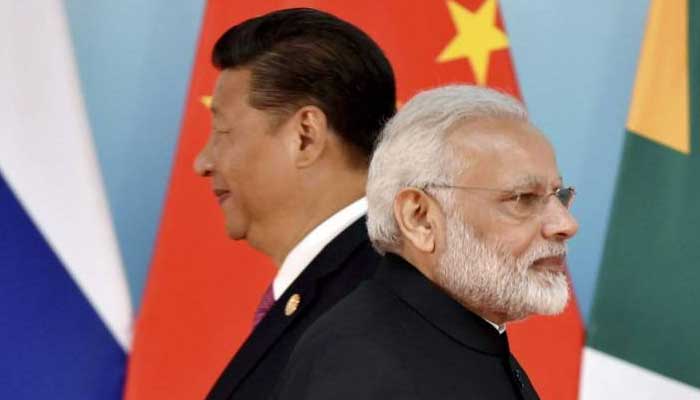India says China’s presence in Indian Ocean a challenge
LONDON: Indian Navy chief Admiral Sunil Lanba has said that China's growing presence in the northern part of the Indian Ocean is a challenge for India but New Delhi is keeping a close eye on the deployment of Chinese ships and submarines in the region.
Admiral Lanba, who is on a four-day visit to Britain, also said that no nation has
invested as much as China in shipbuilding, international media reported. The growing presence of the Chinese navy in the Indian Ocean where it already acquired a logistic base at Djibouti has aroused concerns in India besides acquisition of the Hambantota port in Sri Lanka on a 99-year lease.
"No nation has invested as much as China in shipbuilding. It is a challenge; we keep a close eye on their presence and deployments... it is here to stay," he said during a conversation at the Institute of Strategic Studies in London on Wednesday.
He referred to the presence of an estimated six to eight Chinese naval ships in the northern part of the Indian Ocean at any given time as well as submarines. Admiral Lanba, during a discussion on 'Martime strategy and its contribution to the Indo-Pacific and global commons', said India sees "no post-Brexit challenges" but only opportunities for greater synergies with the UK in naval cooperation.
"Over the years, our multi-faceted bilateral relations have grown from strength to strength to a sustained and mutually beneficial friendship. We have a common perspective on maritime challenges and agree to developing a cooperative framework to face them," Admiral Lanba said.
-
 Prince Harry Warns Meghan Markle To 'step Back'
Prince Harry Warns Meghan Markle To 'step Back' -
 Selena Gomez Explains Why She Thought Lupus Was 'life-or-death'
Selena Gomez Explains Why She Thought Lupus Was 'life-or-death' -
 New Zealand Flood Crisis: State Of Emergency Declared As North Island Braces For More Storms
New Zealand Flood Crisis: State Of Emergency Declared As North Island Braces For More Storms -
 Nancy Guthrie Case: Mystery Deepens As Unknown DNA Found At Property
Nancy Guthrie Case: Mystery Deepens As Unknown DNA Found At Property -
 James Van Der Beek's Brother Breaks Silence On Actor's Tragic Death
James Van Der Beek's Brother Breaks Silence On Actor's Tragic Death -
 Megan Thee Stallion On New Romance With Klay Thompson: 'I'm Comfy'
Megan Thee Stallion On New Romance With Klay Thompson: 'I'm Comfy' -
 Nicole Kidman Celebrates Galentine’s Day Months After Keith Urban Split
Nicole Kidman Celebrates Galentine’s Day Months After Keith Urban Split -
 Justin Bieber Unveils Hailey Bieber As First Face Of SKYLRK In Intimate Campaign Debut
Justin Bieber Unveils Hailey Bieber As First Face Of SKYLRK In Intimate Campaign Debut -
 Caitlin O’Connor Says Fiance Joe Manganiello Has Changed Valentine’s Day For Her
Caitlin O’Connor Says Fiance Joe Manganiello Has Changed Valentine’s Day For Her -
 Rachel Zoe Sends Out Message For Womne With Her Post-divorce Diamond Ring
Rachel Zoe Sends Out Message For Womne With Her Post-divorce Diamond Ring -
 James Van Der Beek's Final Conversation With Director Roger Avary Laid Bare: 'We Cried'
James Van Der Beek's Final Conversation With Director Roger Avary Laid Bare: 'We Cried' -
 Jaden Smith Walks Out Of Interview After Kanye West Question At Film Premiere
Jaden Smith Walks Out Of Interview After Kanye West Question At Film Premiere -
 Michelle Obama Gets Candid About Spontaneous Decision At Piercings Tattoo
Michelle Obama Gets Candid About Spontaneous Decision At Piercings Tattoo -
 Why Halle Berry Wasn't Ready For Marriage After Van Hunt Popped Question? Source
Why Halle Berry Wasn't Ready For Marriage After Van Hunt Popped Question? Source -
 Bunnie Xo Shares Raw Confession After Year-long IVF Struggle
Bunnie Xo Shares Raw Confession After Year-long IVF Struggle -
 Brooks Nader Reveals Why She Quit Fillers After Years
Brooks Nader Reveals Why She Quit Fillers After Years




